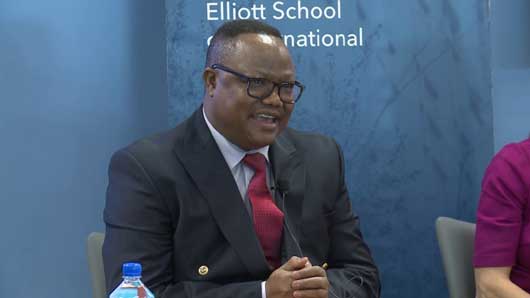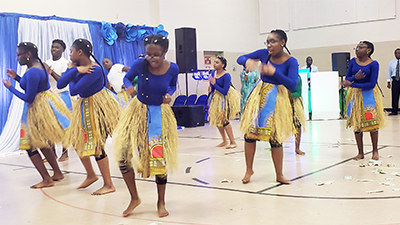After the Guthrie Theater released its exclusive rights to stage a new play about Liberia’s history, Liberians in Minnesota have begun to wonder: Whatever happened to Tap the Leopard?
For Liberians in America, it is going to be another summer of political drama and high suspense in courtrooms and congress chambers around the world.
In June, the former Liberian president Charles Taylor will stand trial in the Hague, Netherlands for alleged crimes against humanity committed during Sierra Leone’s civil war (1991-2002). Beyond that, the fate of 10,000 Liberian legal immigrants in the U.S. remains unknown as their Temporary Protected Status (TPS) runs out in October and they could face deportation.
Consider it a curious plot twist, then, that some Liberians in Minnesota have also directed their concerns to a petition of an utterly different nature and arena: a call for the Guthrie Theater to produce a new groundbreaking play, Tap the Leopard, about West African history.
“The Liberian community has been fascinated by this drama and the process of how it came together,” said Wynfred Russell, who has led an email campaign lobbying the Guthrie to produce Tap the Leopard. “It is a story that needs to be told and one Americans need to know. Liberians have been dying to see something like this in mainstream culture.”
Russell said the script has epic possibilities and touches upon a wide spectrum of Liberia’s history, from its founding by freed African-American slaves to the days when the United States and Firestone Tires ran the country as a quasi-colonial slave state. Russell has singled out the King of Minnesota Theater companies because its directors had commissioned the play in the first place, and many Liberians had hoped to see it produced on one of the Guthrie’s stages for the 2007-08 season. A well-known figure in the Liberian community and professor at the University of Minnesota, Russell had originally assisted Tap the Leopard’s playwright, Kia Corthorn, in her research about the West African nation now led by Africa’s first ever female president, Ellen Johnson- Sirleaf.
“So many institutions in the state have lent a hand to help tell the story of Liberians,” he said. “The Guthrie has the chance to join them and do something no one has done before. We just want them to reconsider or at least work with us.”
In early May, Russell sent out a blanket email to over 350 individuals and organizations asking them to contact Guthrie staff in support of staging Tap the Leopard. He said he has received an enthusiastic response so far, and the Twin Cities Africanist Network even ran his plea in a recent newsletter. Russell went as far as saying that the Liberian community expressed “utter dismay” when they found out that the play would not go on at the theater this year.
Not so fast came word from the Guthrie.
In an email to Russell, the Guthrie’s artistic director, Joe Dowling, wrote that Tap the Leopard is still being considered for production in the Dowling Studio’s 2008-09 season.
“It is a large play and will require further emendations before it will be affordable in our repertoire,” Dowling explained to Russell in the email. “However, we intend to continue a conversation with Kia [Corthorn] about how a production might be achieved and, if it proves practical and affordable, we will look seriously at the possibility of presenting it at a later date.”
“I should also advise you that an orchestrated email campaign on behalf of any work will prove a fruitless exercise towards decision making about Guthrie programming.”
Fruitless or not, Russell said he will continue to petition the theater. He noted that while Corthorn has not participated in the campaign, she has not expressed opposition toward it, either. Kia Corthorn did decline to be interviewed for this article.
"We are not trying to control the creative process at the Guthrie,” said Russell. “We are not saying that they are wrong or that they did anything wrong. We do not want to be antagonistic. We just want to show that this is a story worth telling.”
Story Behind the Story: Acts I-III
While the divide in the behind-the-scenes story appears to be one of community expectation versus artistic direction and choice, subtleties abound as thick as Shakespearean subplots.
Act I: In 2003, the Guthrie Theater selected 11 writers, including Corthorn, to travel around the world, research other countries and cultures, and write about the experiences. It was called the New Play Program and funded by the Bush Foundation. Choosing Liberia, Corthorn went to West Africa just as it entered a new phase of healing after some 15 years of civil wars and inter-regional conflicts. In itself, the journey offered dramatic possibilities as Corthorn is a celebrated African-American playwright who went to a country founded by freed African-American slaves to learn about its history and to observe a vision for its more hopeful, peaceful, and prosperous future.
Act II: Corthorn wrote and developed Tap the Leopard, enlisting the support of the likes of Russell and others in the Liberian community in Minnesota besides many other people in Liberia. Corthorn’s focus on a large African community in the Twin Cities does not come without its own history. She wrote Snapshot Silhouette about, in part, divisions and connections between Somalis and African-Americans in Minnesota, and, in 2004, it premiered at the Children’s Theater in Minneapolis to critical acclaim.
Act III: In 2006, the Guthrie assisted Corthorn and company to stage professional public readings of Tap the Leopard, which was well received. When the Guthrie announced its 2007-08 season in the spring, the play was not listed and soon began Russell’s campaign.
As Dowling noted in his correspondence with Russell, the Guthrie never made promises that they would produce any of the plays by the 11 writers in the New Play Program. In fact, the Guthrie just launched the first world premiere from the New Play Program (May 23-June 10), Boats on a River by Julie Marie Myatt, in the Dowling Studio. It follows two Western aid workers in Cambodia and focuses on the child sex slave trade in Southeast Asia and the rehabilitation of Cambodian girls out of the brothels.
The story surrounding Tap the Leopard so far has led some figures in the Twin Cities arts community to comment on the need for more international productions in theater.
How will Acts IV and V turn out?
As the Guthrie no longer has exclusive rights to stage Tap the Leopard, Corthorn is free to explore other venues throughout the country. For many Liberians in Minnesota, however, the only happy ending can come if the production makes its world premiere on a stage at the Guthrie.
About Jeremy O'Kasick







